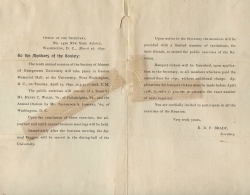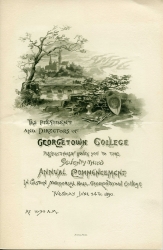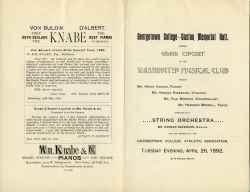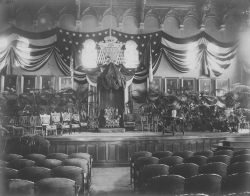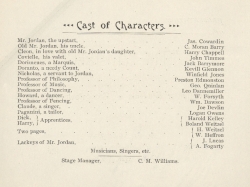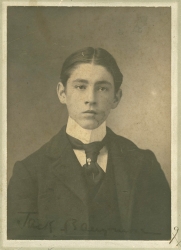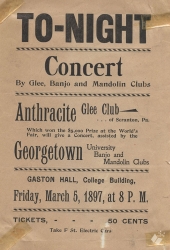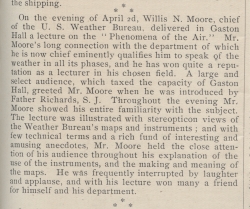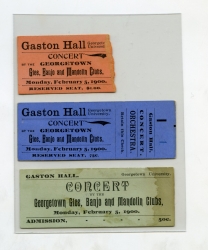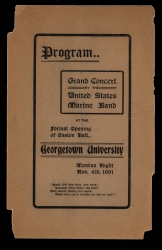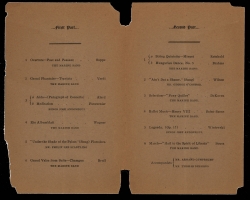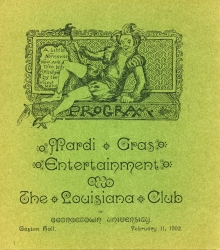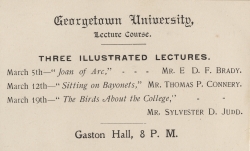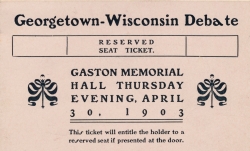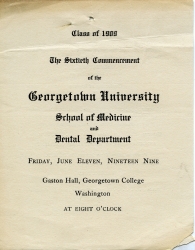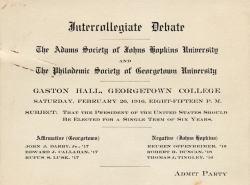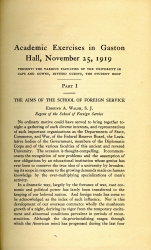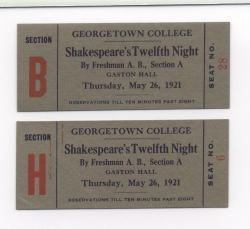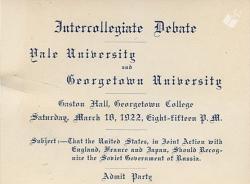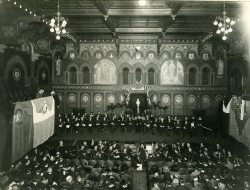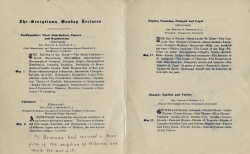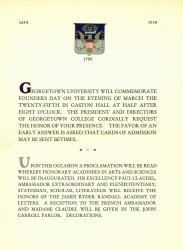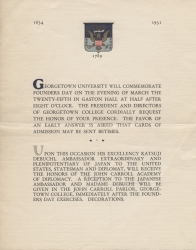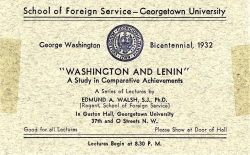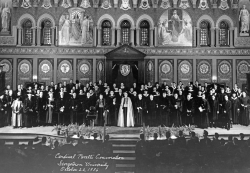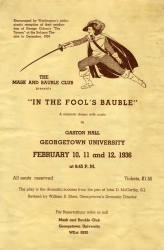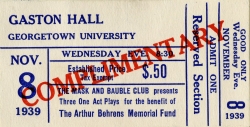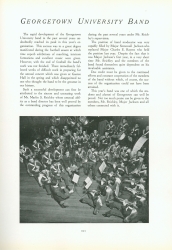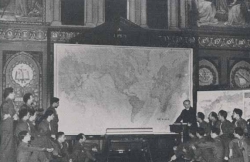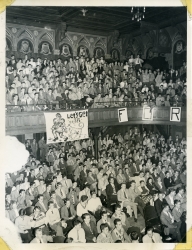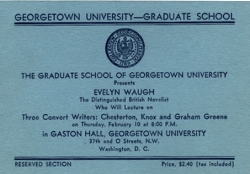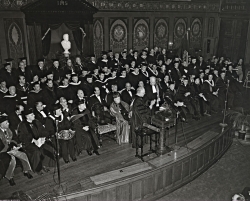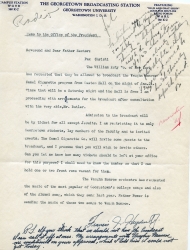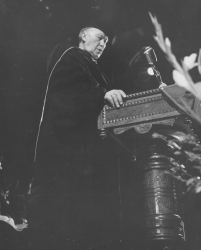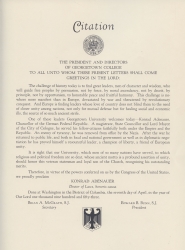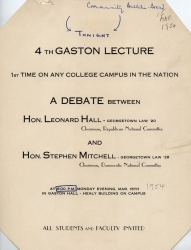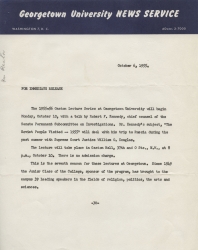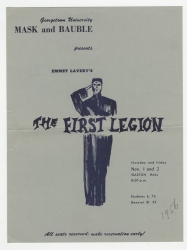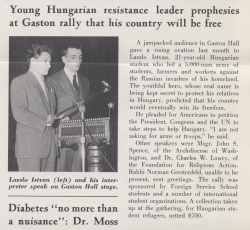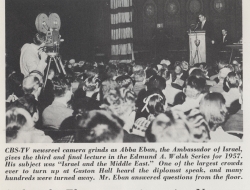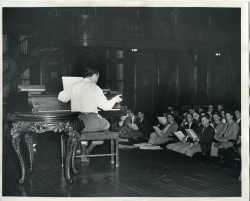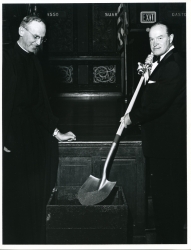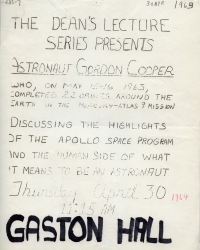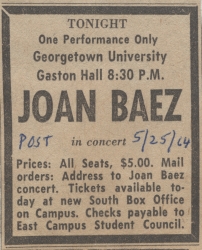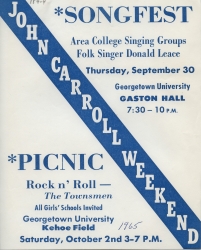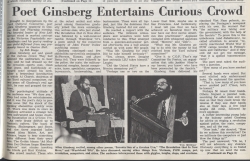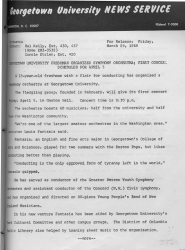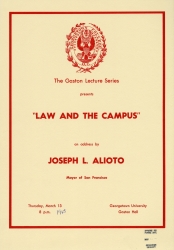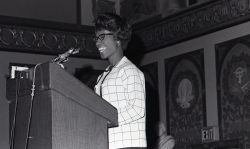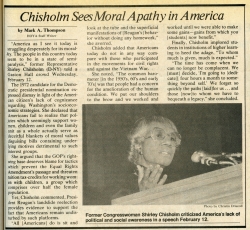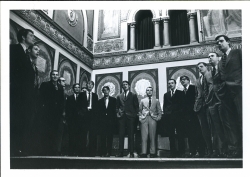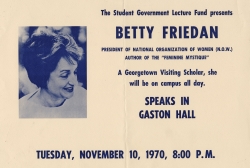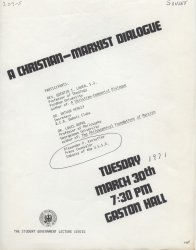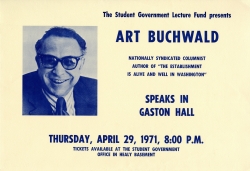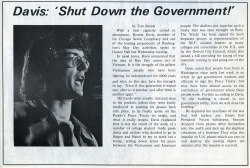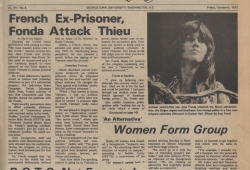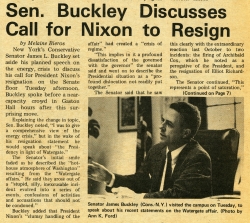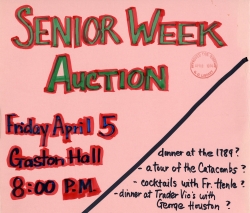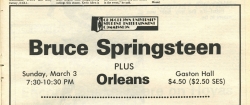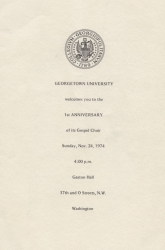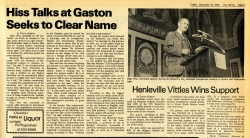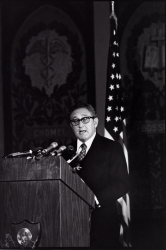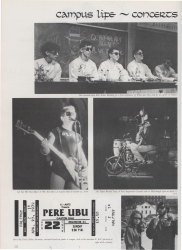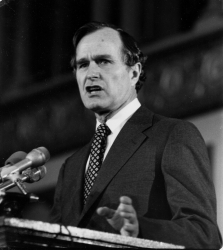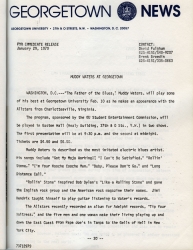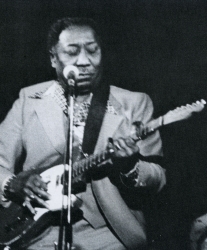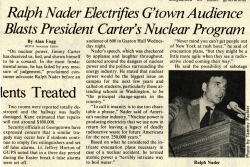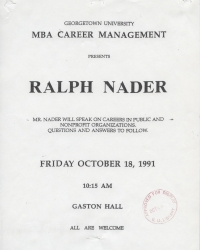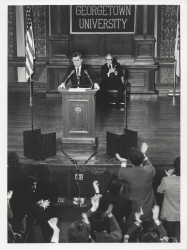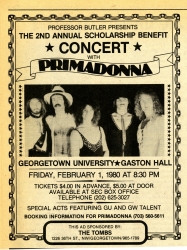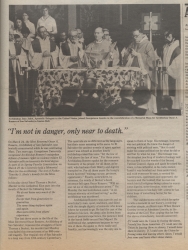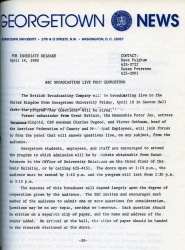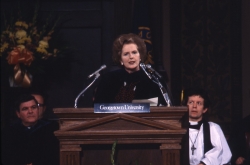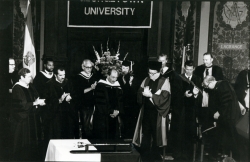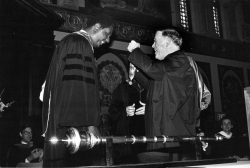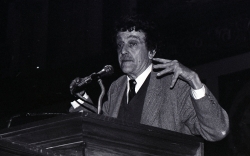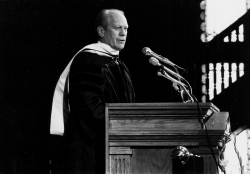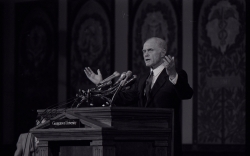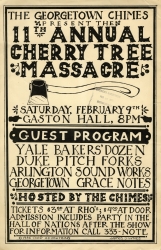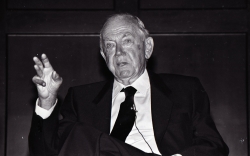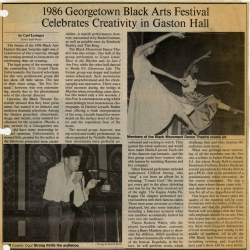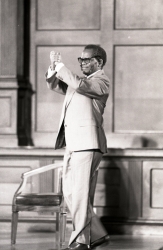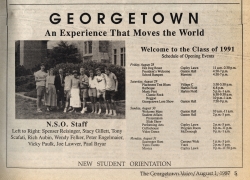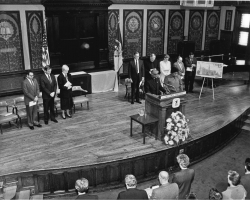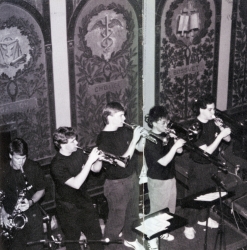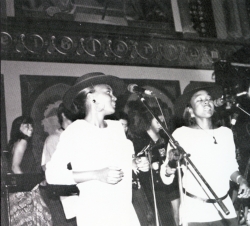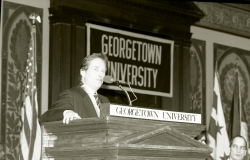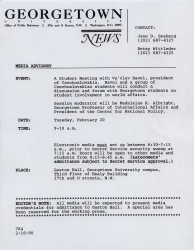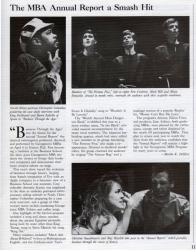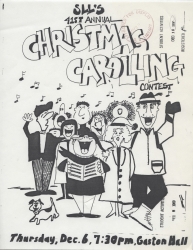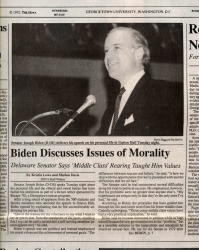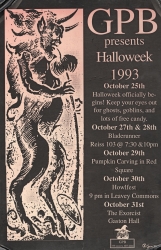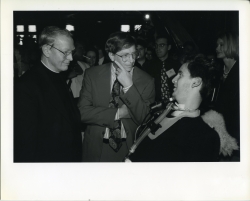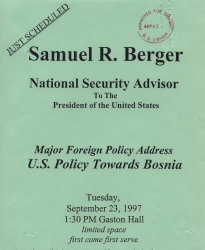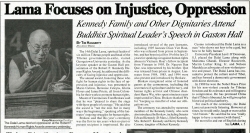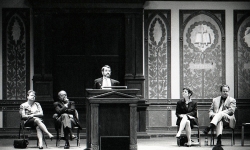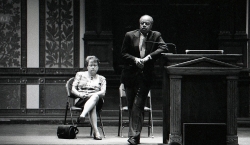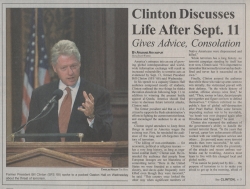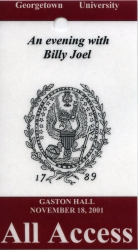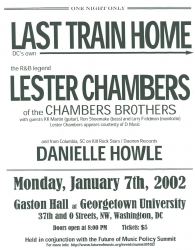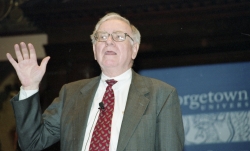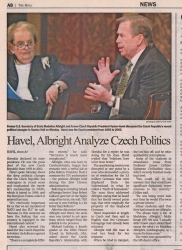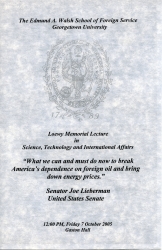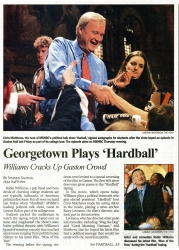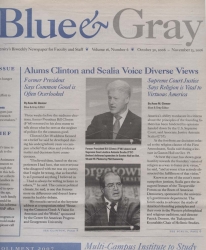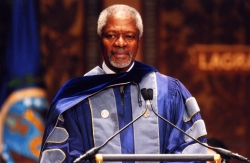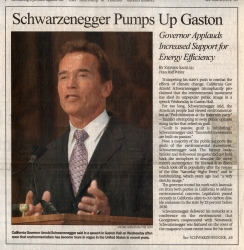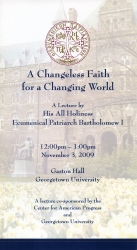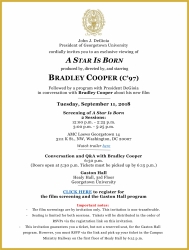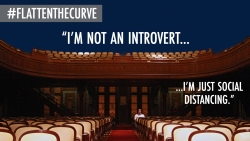The first event held in Gaston Hall was Georgetown's 1879 commencement ceremony; President Rutherford B. Hayes was among the attendees. Since then, the space has hosted many events and visitors, both high profile and more mundane, and this exhibition highlights just a few of these. The exhibition’s chronological arrangement, which juxtaposes a photograph of a 1940s football rally with a ticket for a 1948 lecture by British novelist Evelyn Waugh, an advertisement for a 1974 Bruce Springsteen concert with an invitation to the first anniversary performance of the Georgetown University Gospel Choir, and a photograph of ANC President Oliver Tambo speaking in1987 with a schedule for New Student Orientation, emphasizes the eclecticism of Gaston Hall speakers, performances, and events.
Invitation to commencement, June 24, 1890
Commencements were traditionally held in Gaston Hall until World War I, when the main ceremony moved to Healy lawn. However, Gaston was used as a rain site and continued to host other commencement-related events.
Program for concert by the Washington Musical Club, April 26, 1892
Among the musicians listed are Paul Miersch, a German-born composer, who came to the U.S. in 1892 and was solo cellist with the New York Symphony Orchestra between 1893 and 1898; and Herndon Morsell, who had previously toured with John Philip Sousa as a guest artist with the Marine Band and had sung with the Boston Opera Company.
Gaston Hall as decorated for Francesco Cardinal Satolli’s farewell reception, April 30, 1896
After speeches by University officials, there was a musical performance by members of the University Glee and Banjo Clubs. Cardinal Satolli, the first Apostolic Delegate to the United States, was returning to Rome after his appointment as Prefect of the Congregation of Studies and Archpriest of the Lateran Basilica.
Program for the play "The Upstart," put on in Gaston Hall by members of the Preparatory Division, November 13, 1896. Photograph of Prep student John Barrymore, who acted in it.
Included in the program’s cast list is the name Jack Barrymore. John “Jack” Barrymore was enrolled at Georgetown College from 1895 to 1898. A member of a famous acting family, he went on to have a successful stage and screen career; actress and producer Drew Barrymore is his granddaughter.
Poster for concert by the Anthracite Glee Club and the Georgetown University Banjo and Mandolin Clubs, March 5, 1897
The Anthracite Glee Club of Scranton, Pennsylvania had come to D.C. to take part in celebrations surrounding the first inauguration of President William McKinley on March 4, 1897.
Account of lecture by the Chief of the Weather Bureau on April 2, 1897. Georgetown College Journal, April 1897
Professor Willis Moore served as chief of the Weather Bureau from 1895 to 1913.
Tickets for Glee, Banjo and Mandolin Clubs concert, February 5, 1900
Note that the tickets are color-coded by price.
Program for a United States Marine Band concert to mark the formal opening of Gaston Hall, November 4, 1901
Although Gaston Hall had been in use for over twenty years, the University held a formal opening event in 1901 to celebrate the decorative finishings of Brother Francis Schroen, S.J. He created the murals, the central focus of the space, as well as other details such as the crests of other Jesuit schools which ring the Hall.
Program for Mardi Gras Entertainment put on by the Louisiana Club, February 11, 1902
The first printed reference to Mardi Gras celebrations on campus is found in the March 1874 issue of the Georgetown College Journal (then the student newspaper). However, it is probable that the southern students on campus celebrated the occasion even before that date.
Ticket for Georgetown-Wisconsin debate, April 30, 1903
Three debaters from the Georgetown University Law School competed against three from the University of Wisconsin Law School. Their debate topic was whether compulsory arbitration between capital and labor was expedient. Georgetown, which argued for the affirmative, lost the competition.
Program for the “Sixtieth Commencement” of the Georgetown University School of Medicine and Dental Department, June 11, 1909
The determination that the 1909 Medical School commencement was its “sixtieth” is understandable but incorrect. Four local doctors approached the Georgetown University President in 1849 proposing that a medical school be set up under the auspices of the University. However, the Georgetown University Medical School did not graduate any students until 1852.
Ticket for Georgetown-Johns Hopkins University Debate, February 26, 1916
The Georgetown debaters successfully argued in favor of the proposition that the President of the United States should be elected for a single term of six years.
Page one of a transcription of the Academic Exercises in Gaston Hall to celebrate the opening of the School of Foreign Service, November 25, 1919. From the Georgetown University School of Foreign Service Yearbook, February 1919-February 1920.
The School celebrated its 100th anniversary during the 2019-2020 academic year. An online exhibition on its history can be viewed here.
Ticket for Georgetown-Yale debate, March 22, 1922
The topic was whether the United States, in joint action with England, France and Japan, should recognize the Soviet Government of Russia. Georgetown argued the negative position and won. The United States government agreed with this stance; it was not until November 16, 1933, that President Franklin Roosevelt ended almost 16 years of American non-recognition of the Soviet Union.
Inauguration of the Pan American Students Association, January 28, 1923
Established in the Foreign Service School, the Pan American Students Association served as a means for encouraging intellectual interaction among students from the Americas. It was inaugurated with a ceremony attended by ambassadors from many Latin American countries.
Program for Georgetown Monday Lectures, May 1922
These lectures were given throughout 1922 by Georgetown faculty and administrators on a variety of topics. Later lectures included Dreams, Dreaming, and Dreamers and Our Trees in Autumn and Spring. The lectures were open to the public and were advertised in The Washington Post.
“Polish Prelate Visits College.” The Hoya, December 4, 1925
Archbishop Jan Cieplak spoke in Gaston Hall on November 15, 1925, three months before his death. In the spring of 1923, he had been sentenced to death at a show trial in Moscow. Released after international pressure in 1924, he traveled to Rome and then to the U.S.
Invitations to Founders Day celebrations, March 25, 1930 and March 25, 1931
Georgetown began celebrating Founders Day on March 25 during the presidency of Coleman Nevils, S.J. (1928-1935). The first settlers who came to Maryland from England on the ships the Ark and the Dove, landed on St. Clements Island on March 25, 1634; you can see that year printed on the invitations. Nevils was given to suggesting, via elaborate and convoluted reasoning, that Georgetown could trace its origins to the earliest days of Maryland and to Jesuits who travelled there with aspirations of starting a college. This line of thinking allowed him to argue that Georgetown pre-dated even Harvard and thus was the oldest college in the country, not simply the oldest Catholic college.
Founders Day was celebrated on campus until 1968.
Ticket to a series of lectures by Edmund A. Walsh, S.J. on “Washington and Lenin: A Study in Comparative Achievements,” spring 1932
Father Walsh, for whom the Georgetown School of Foreign Service is named, began an annual series of lectures on aspects of the Soviet Union in 1925. 1932 was the bicentennial of George Washington's birth. University President Coleman Nevils, S.J. introduced the first of that year’s lectures on February 19th by saying, according to coverage in The Hoya, that Georgetown University could do no better than present a study of George Washignton, and that the contrasts between the two revolutionaries, Washington and Lenin, would be especially effective as white appears the more snowy when compared with black.
Convocation for Cardinal Pacelli, October 22, 1936
In 1936, Eugenio Cardinal Pacelli, the Papal Secretary of State, visited the U.S. and was awarded an honorary degree by Georgetown. The audience for the ceremony was limited to the senior class. After the degree had been conferred, the class honored the Cardinal with a variation of the Georgetown cheer normally delivered at sporting events as: Hoya, Hoya, Saxa! Hoya, Hoya, Georgetown! -Team, Team, Team! John G. Bowen (LL.B. 1921, LL.M. 1922, Ph.D. 1933), describes the Cardinal’s reaction in the 1966 compilation, “On the Hilltop: Reflections and Reminiscences on their Campus Years by Georgetown Alumni”: The Cardinal had just come from Paris and seen the turbulence of shouting students in the area of the Sorbonne . . . At the instant the future pope finished his speech, up rose the President of the Yard [the College’s student government]. Waving his fist high, he shouted, “OK fellows. Hit it!” Every man jumped to his feet . . . the Cardinal’s eyes bugged out as he sat terrified. The whole class thundered: “Hoya, Hoya, Saxa! Hoya, Hoya Georgetown! Hoya Pacelli, Pacelli, Pacelli!” and broke into vigorous applause. The Cardinal smiled. Afterward in the President’s office he said: “I think I will start something new. This will be the cheer of the College of Cardinals.”
Cardinal Pacelli was elected to the Papacy in 1939 and assumed the name Pius XII.
Handbill for Mask and Bauble performance of “In the Fool’s Bauble," February 10, 11 and 12, 1938; and ticket for Three One Act Plays for the benefit of the Arthur Behrens Memorial Fund, November 8, 1939
Arthur Behrens, the Director of the Mask and Bauble Club, died in July 1939.
Georgetown University Band pictured during their annual concert in Gaston Hall in 1938. Ye Domesday Booke, 1938
Father Edmund A. Walsh, S.J. with students, 1944. From the Georgetown College Journal, January 1944
This image may be unique among the photographs in the University Archives collection in that it shows Gaston Hall being used as a classroom. The students pictured are wearing military uniforms because they are part of the Army Specialized Training Program. Under this program, the War Department designated a select number of universities around the country to provide training to both junior officers and soldiers in fields such as foreign languages and regional studies, engineering, and medicine.
“Fordham HAD a Ram.” The Hoya, October 11, 1946
Kidnapping the mascot of opposing football teams was not uncommon in the 1940s. In October 1946, it was the Fordham mascot that was kidnapped and put on display before the student body at a rally in Gaston Hall before its return to Fordham.
Football rally, 1940s
This photograph provides a view from the Gaston Hall stage, a somewhat unique perspective among the photographs of the Hall in the University Archives collection.
Inauguration of J. Hunter Guthrie, S.J. as Georgetown University President, May 1, 1949
This presidential inauguration ceremony was the first at Georgetown since 1935 when Arthur A. O’Leary, S.J. was inaugurated. Because of World War II, no formal inauguration was held for Father O’Leary’s successor, Lawrence C. Gorman, S.J., appointed President in 1942.
Letter from Francis Heyden, S.J. to University Rector (President) Lawrence C. Gorman, S.J. about a broadcast of Vaughn Monroe’s Camel Caravan radio show from Gaston Hall on January 8, 1949
The Camel Caravan show, hosted by Monroe, a singer, trumpeter, big band leader, actor and businessman, was sponsored by the Camel Cigarette Company. Father Heyden, whose name will be associated by many with the Georgetown Observatory, was also very interested in radio. He conducted a Mass for Shut-Ins from Dahlgren Chapel which was broadcast every Sunday and was moderator of the campus radio station WGTB, whose name is seen at the top of this letter.
Konrad Adenauer speaking at an Academic Convocation in his honor, April 7, 1953. Honorary degree citation for Chancellor Adenauer
Konrad Adenauer, Chancellor of the Federal Republic of Germany, was awarded an honorary Doctor of Laws degree by Georgetown. His honorary degree citation describes him as an enemy of tyranny and a champion of liberty. Adenauer was in Washington, D.C. for meetings with President Eisenhower and State and Defense Department officials.
Flyer for debate between Leonard Hall, L’20, Chair of the Republican National Committee, and Stephen Mitchell, L’28, Chair of the Democratic National Committee, March 15, 1954
The debate consisted of a 20-minute talk by each speaker, a 10-minute rebuttal by each and 30 minutes of replies to written questions submitted from the floor.
Georgetown University News Service release for a speech by Robert F. Kennedy on “The Soviet People Visited -- 1955” to be given on October 10, 1955
“Young Hungarian resistance leader prophesies at Gaston Rally that his country will be free.” Georgetown Record, December 1956
On November 26, 1956, just at the close of the Hungarian Revolution, a 21-year-old Hungarian, using an assumed name to protect his identity, spoke through an interpreter.
Ambassador of Israel Abba Eban speaks on “Israel and the Middle East” on April 9, 1957. Pictured in the Georgetown Record, May 1957
Bob Hope and T. Byron Collins, S.J., Vice President for Business Management, at Science Building [Reiss] groundbreaking ceremonies in Gaston Hall, October 9, 1960
Bob Hope, whose son Anthony was enrolled in the College, was toastmaster at the formal dinner that followed the groundbreaking ceremony. Mr. Hope returned to campus in 1962 to receive an honorary degree which was awarded at his son’s commencement ceremony.
Poster for talk on the Apollo Space Program by astronaut Leroy Gordon Cooper, Jr., April 30, 1964
In 1963, Cooper piloted the last Mercury spaceflight; during that mission he became the first American to spend 24 hours in space. Two years later, he became the first astronaut to make a second orbital flight when he piloted Gemini 5.
Washington Post notice of a concert by contemporary folk singer Joan Baez on May 25, 1964
This concert was put together on relatively short notice. Ms. Baez apparently had a free day on her itinerary and the East Campus Student Council persuaded her to play.
Georgetown University News Service release on the first concert given by the Georgetown Symphony Orchestra, April 5, 1968
Program for lecture by San Francisco Mayor Joseph L. Alioto on “Law and the Campus”, March 13, 1969
This lecture did not take place. Members of Students for a Democratic Society (SDS), most of whom were not Georgetown students, stormed the event and prevented the Mayor from speaking. Their protest was motivated by the Mayor’s decision to call in the National Guard and San Francisco police to break up a peaceful protest against the Vietnam War and for social justice by students at San Francisco State.
Representative Shirley Chisholm speaks as part of Georgetown’s first Black Awareness Week, April 16, 1969. “Chisholm Sees Moral Apathy in America.” The Hoya, February 21, 1986
Representative Chisholm became the first African American woman elected to the U.S. Congress; she represented New York's 12th Congressional District from 1969 to 1983. Among other speakers at the 1969 event were Rev. Channing E. Phillips, Julius Hobson, James Farmer, and Joseph Applegate.
Former Representative Chisholm returned to speak, almost 17 years after her first appearance, on February 12, 1986.
The Chimes sing at the dedication of Lauinger Library, April 25, 1970
The Library is named for Joseph Mark Lauinger, C’1967, who was an active member of The Chimes. At the dedication ceremony, after an address by Dr. Donald R. Penn, long-time professor of History at Georgetown, the Chimes took the stage, with a number of Chimes alumni joining the student members.
Poster for a speech by Betty Friedan, sponsored by the Student Government Lecture Fund, November 10, 1970
Declaring that no man, woman, or child can escape the necessity of completing this revolution, Ms. Friedan spoke about the Women’s Liberation Movement in a packed Gaston Hall. She returned to campus on October 2, 1984, again to Gaston Hall, and spoke about the state of the women’s movement in the U.S. and the changing role of women in contemporary society at an event sponsored by the Lecture Fund.
Flyer for A Christian-Marxist Dialogue sponsored by the Student Government Lecture Series, March 30, 1971
Poster for speech by Art Buchwald, sponsored by the Student Government Lecture Fund, April 29, 1971
Humorist Art Buchwald returned to campus in 1979 when he delivered the commencement address.
“Davis: ‘Shut Down the Government!’” The Hoya, April 30, 1971
Rennard Cordon "Rennie" Davis is best known as an anti-Vietnam war activist. He was one of the Chicago Seven defendants charged for protests at the 1968 Democratic National Convention. He spoke on the eve of large-scale anti-war protests in Washington, D.C. over the May Day weekend.
“French Ex-Prisoner, Fonda Attack Thieu,” The Hoya, October 5, 1973
Jane Fonda and a number of other anti-Vietnam War activists, including Thomas Emmet “Tom” Hayden who was married to Ms. Fonda from 1973 to 1990, spoke to a capacity crowd in Gaston on October 4, 1973.
“Senator Buckley Discusses Call for Nixon to Resign.” The Hoya, March 22, 1974
Senator James Buckley was a Republican from New York. He surprised many of his Republican colleagues when he called for the increasingly-embattled President to resign.
Ad for Bruce Springsteen concert, The Hoya, March 1, 1974
Originally planned for the previous month and for McDonough Gym, this concert earned Springsteen $1500. He was touring in support of his second album, The Wild, The Innocent & The E Street Shuffle, which had been released in November 1973.
Invitation to the first anniversary performance of the Georgetown University Gospel Choir, November 24, 1974
“Hiss Talks at Gaston, Seeks to Clear Name.” The Hoya, November 10, 1976
Alger Hiss was an American government official who was accused of spying for the Soviet Union in 1948. He was not tried because the statute of limitations had run out, but he was convicted of perjury in connection with the charge in 1950.
Henry Kissinger delivers the Frank C. Nash Memorial Lecture on International Security Affairs, April 5, 1977
Effective March 1, 1977, Dr. Henry A. Kissinger, former Secretary of State, accepted a joint appointment as Visiting Professor of Diplomacy at the Foreign Service School and as Counselor to Georgetown’s Center for Strategic and International Studies (CSIS). The initial appointment was for six months. Dr. Kissinger was appointed University Professor of Diplomacy in the summer of 1977. The appointment of Dr. Kissinger was not without controversy and Students Opposed to the Appointment of Kissinger [SOAK] campaigned for a review of it on procedural and moral grounds. The actions of SOAK led to the formation of an opposition group on campus, Students Taking Advantage of the Kissinger Experience [STAKE.]
Devo plays Gaston Hall, October 21, 1978. Pictured in Ye Domesday Booke 1979
Devo toured from October 1978-August 1979 in support of their debut studio album Q: Are We Not Men? A: We Are Devo! The Gaston Hall concert was their first concert in the Washington, D.C. area. They had appeared as musical guests on NBC’s Saturday Night Live the previous week.
George H. W. Bush speaks, January 25, 1979
Former envoy to China George Bush spoke to a capacity crowd in Gaston Hall. He spent much of his speech attacking President Carter's foreign policy, which he called one of splendid oscillation. He stopped short of declaring his candidacy for the 1980 Republican presidential nomination, although, when asked by a student if he was a candidate, he replied that he had not made a super-final decision but was keenly interested in seeking the nomination.
“Muddy Waters at Georgetown.” Georgetown News release, January 29, 1979. Muddy Waters pictured in Ye Domesday Booke, 1979
“Ralph Nader Electrifies G’town Audience, Blasts President Carter’s Nuclear Program.” The Hoya, April 20, 1979. MBA Career Management presents Ralph Nader, October 18, 1991
Ralph Nader has spoken at Georgetown on multiple other occasions, including in March 1972 when he spoke in Gaston Hall in support of the D.C. Public Interest Research Group (PIRG), in April 1974 when he argued at the Law Center in favor of a re-evaluation of the legal system, and in September 1974 when he spoke in Gaston about America’s “inverted society.”
Senator Edward Kennedy delivers a major policy address, January 28, 1980
Senator Kennedy reaffirmed his candidacy for the presidency. He called for mandatory wage and price controls and a six-month freeze on inflation. He later lost the Democratic primary to incumbent president, Jimmy Carter, ending his campaign at the national convention in August 1980.
Ad for Professor Patrick Butler’s 2nd Annual Scholarship Benefit Concert with Primadonna, Georgetown Voice, January 29, 1980
All proceeds from the concert went to Georgetown’s general scholarship fund.
Memorial mass for the Most Reverend Oscar A. Romero, Archbishop of San Salvador, March 29, 1980. From The Record, April 9, 1980
In mid-December 1977, the Georgetown University Board of Directors unanimously approved an honorary doctorate for Archbishop Romero, a human rights and social justice advocate, as a symbol of North American solidarity with the Salvadoran people. The degree was conferred on February 14, 1978, in the Cathedral of San Salvador. An audience of five thousand packed the Cathedral, while another five thousand listened to the ceremony over loudspeakers outside. On March 24, 1980, the Archbishop was assassinated while celebrating Mass.
“BBC Broadcasting Live From Georgetown.” Georgetown News, April 14, 1980
Any Questions? is a popular British radio show during which the audience is invited to ask questions of a panel which typically include members of the media, politics, the arts, etc. The show still runs on BBC Radio 4.
Margaret Thatcher, Prime Minister of Great Britain, is awarded an honorary degree, February 2, 1981. Photograph by Bill Auth
Mohamed Anwar El-Sadat, President of the Arab Republic of Egypt, receives an honorary degree, August 8, 1981
Basketball Coach John Thompson II receives the President’s Medal from University President Timothy S. Healy, S.J., April 24, 1982
The Medal citation, written by President Healy, reads in part: . . . His classroom is first of all a basketball court and his subject a game. But the real tools of his trade are the blending of fifteen young people into a working unit, the jazz-like improvisation which his game demands, the discipline required to work body and mind together into a dance as intricate as any ever invented by the mind of man, and finally the beauty of the body’s movement which must condition the soul. It is a teaching as old as the games of Greece, and its goal is the hard moral base of citizenship . . .
President Gerald Ford receives an honorary degree as part of the ceremonies to re-dedicate Old North, November 2, 1983
Georgetown President Timothy S. Healy, S.J., conferred an honorary degree on former President Ford at an academic convocation in Gaston Hall after the rededication of Old North. School of Business Administration Dean Ronald L. Smith read the citation, saying of President Ford: In the White House, he restored a constructive, judicious use of power. His warmth, serenity, and confidence were catalysts in renewing the faith of our countrymen in America and its presidency.
Senator John Glenn speaks, November 16, 1983
Senator Glenn used his speech to continue his attacks on his chief rival for the Democratic Presidential nomination, former Vice President Walter F. Mondale, especially on the projected costs of his proposed jobs and education programs: The American people know that a candidate who promises everything to everybody can’t be serious about controlling the federal budget. Mondale was selected as the nominee the following year.
Graham Greene participates in a question-and-answer session about his career, October 7, 1985
The Library Associates and the Dean of the College of Arts and Sciences co-sponsored this event. The English author was 81 years old when he visited. Sharing the platform with Greene were English Professor Raymond H. Reno and John B. Breslin, S.J., Director of the Georgetown University Press. Radio and television announcer Paul Anthony, B’1964, served as moderator.
“1986 Georgetown Black Arts Festival Celebrates Creativity in Gaston Hall.” The Hoya, November 7, 1986
ANC President Oliver Tambo, January 27, 1987
Mr. Tambo received a very warm welcome from the audience of mainly students, some of whom unfurled banners in support of the African National Congress (ANC). He responded by saying: The American people have given the people hope by their actions in the last two years . . . They have come down on the right side of history [by imposing sanctions against the South African Government].
Schedule for New Student Orientation program for the Class of 1991. Printed in the Georgetown Voice, August 1, 1987
Several of the listed events took place in Gaston Hall.
Ceremony to mark the appearance of Healy Hall on a 15-cent postal card issued by the United States Post Office, January 23, 1989
The postal card was issued to mark Georgetown University’s Bicentennial.
Coverage of Cabaret ‘89 in Ye Domesday Booke 1989
1989 marked the first year that Cabaret was held in Gaston Hall. In previous years, it had been held in the Hall of Nations, in Copley Formal Lounge, or in Darnall.
President of Czechoslovakia Vaclav Havel appears at a forum on student involvement in world affairs, February 20, 1990. Georgetown News release about the forum, February 16, 1990
President Havel came to D.C. shortly after the Velvet Revolution, which saw the overthrow of the Communist government in Czechoslovakia through peaceful protest. He brought with him a group of Czech students who had helped topple the Communist regime. Georgetown was one of the first places he visited; he said he wanted to visit students because students played an important role in our Velvet Revolution.
Havel served as President of Czechoslovakia until 1992, when Slovakia declared its independence. He was president of the new Czech Republic from 1993-2003 and returned to Georgetown in 2005, see below.
“The MBA Annual Report a Smash Hit.” From Georgetown Business magazine, fall 1990
“Business Through the Ages” was the theme for the second “Annual Report,” the musical extravaganza produced, directed and performed by Georgetown MBAs . . .
Poster for the School of Languages and Linguistics 41st Annual Christmas Caroling Contest, December 6, 1991
“Biden Discusses Issues of Morality.” The Hoya, February 14, 1992
The organizers of the Escape retreat program invited Senator Joe Biden to reflect about his private life and his experience in American politics on February 11, 1992.
Georgetown Program Board events, Halloweek 1993
Among the events listed, a showing of The Exorcist in Gaston Hall on October 31. The Exorcist crew spent approximately twenty days filming in the Washington area in 1972, including seven days on campus. William Peter Blatty (C’1950) won an Academy Award in 1973 for the movie’s screenplay which was based on his bestselling novel of the same name.
Bill Gates, November 28, 1995
Pictured to the left is Georgetown University President, Leo J. O’Donovan, S.J.
“Lama Focuses on Injustice, Oppression.” The Hoya, November 9, 1998
The Dalai Lama was the keynote speaker at the Robert F. Kennedy Human Rights Award ceremony. He had previously spoken in the Hall of Nations in 1979.
School of Foreign Service symposium, September 12, 2001
One of the key features of the University’s immediate response to the 9/11 terror attacks was to find ways for people on campus to come together and support each other. In addition to vigils and prayer services, students had the opportunity to talk with faculty members in a series of symposia about foreign affairs, philosophy and theology. Pictured is one of these symposia, featuring School of Foreign Service faculty. Among those pictured: Carol Lancaster, Tony Arend and Don McHenry.
“Clinton Discusses Life after Sept. 11.” The Hoya, November 7, 2001
Bill Clinton, F’1968, has visited campus multiple times, as Governor of Arkansas, as a Presidential candidate, as President, and as former President.
All Access Pass to An Evening with Billy Joel, November 18, 2001
Joel spoke about his experiences as a musician and about the past, present, and future of rock and popular music. He also performed several of his best known songs, playing Piano Man as his finale.
Chairman and CEO of Berkshire Hathaway Warren Buffett advises MBA students on success and ethics in business, November 14, 2002
You can forget any formula I tell you about stocks . . . You will be a successful person if your kids, your spouse, your grandchildren respect you . . .
Buffett returned to Gaston in November 2013 when he spoke about investment advice, his early years in D.C. during World War II, and his partnership with the Bill and Melinda Gates Foundation.
“Havel, Albright Analyze Czech Politics.” The Hoya, May 2005
The event, held May 2, 2005, was billed as “A Unique Conversation” with The Honorable Madeleine Albright, Mortara Distinguished Professor of Diplomacy, and Vaclav Havel, former President of the Czech Republic. It was presented by Robert L. Gallucci, Dean of the Edmund A. Walsh School of Foreign Service.
Program for the Loewy Memorial Lecture in Science, Technology and International Affairs delivered by Sen. Joe Lieberman on the topic of “What we can and must do now to break America’s dependence on foreign oil and bring down energy prices”, Oct 7, 2005
An account of Senator Lieberman’s speech is available in The Hoya, October 14, 2005
“Georgetown Plays ‘Hardball’: Williams Cracks Up Gaston Crowd.” The Hoya, October 12, 2006
MSNBC’s political talk show, Hardball, was taped in Gaston Hall on October 11, 2006. During the show, guest Robin Williams talked about his latest film, Man of the Year, which had been screened in Gaston the previous night.
“Alums Clinton and Scalia Voice Diverse Views: Former President Says Common Good is Often Overlooked. Supreme Court Justice Says Religion is Vital to a Virtuous America.” Blue & Gray, October 30, 2006-November 13, 2006
President Clinton spoke in Gaston Hall on October 18, 2006; Justice Scalia delivered the inaugural lecture of the Tocqueville Forum on the Roots of American Democracy the next day.
Kofi Annan, Secretary General of the United Nations speaks, October 30, 2006
After receiving an honorary degree, Secretary General Annan delivered an address, concluding with a call for international leaders to increase their monetary and structural support to African nations: We must work with [Africa’s leaders] and invest in them to build a better future that must be theirs. He had previously visited campus in February 1999 to receive the Institute for the Study of Diplomacy’s Jit Trainor Award, an award given to those who demonstrate distinction in the conduct of diplomacy.
“Schwarzenegger Pumps Up Gaston: Governor Applauds Increased Support for Energy Efficiency.” The Hoya, April 11, 2007
“A Changeless Faith for a Changing World.“ Lecture by His All Holiness Ecumenical Patriarch Bartholomew I, November 3, 2009
His All Holiness Ecumenical Patriarch Bartholomew I, the ecumenical patriarch of Orthodox Christianity, discussed the nature of progress at this lecture co-sponsored by the Center for American Progress and Georgetown University.
Invitation to a screening of A Star is Born, followed by a Q & A Session in Gaston Hall with Bradley Cooper, C’1997, September 11, 2018
A Star Is Born was produced and directed by Bradley Cooper (in his directorial debut) and written by Cooper, Eric Roth and Will Fetters. Starring Cooper, Lady Gaga, Dave Chappelle, Andrew Dice Clay and Sam Elliott, the film received eight Academy Award nominations, among them Best Picture and Best Actor (Cooper), Best Actress (Gaga) and Best Supporting Actor (Elliott); it won Best Original Song for Gaga's Shallow.
Gaston Hall as featured in a social distancing message created by Steve Fernie, Lauinger Library's Web Services Coordinator, March 2020
Created at a time when all events on campus, in Gaston Hall or elsewhere, were cancelled because of the coronavirus pandemic, this slide depicting an almost empty Gaston Hall (with Steve Fernie in the background) conveys a visually striking message about the need to #FLATTENTHECURVE.
Curated by Lynn Conway, University Archivist

